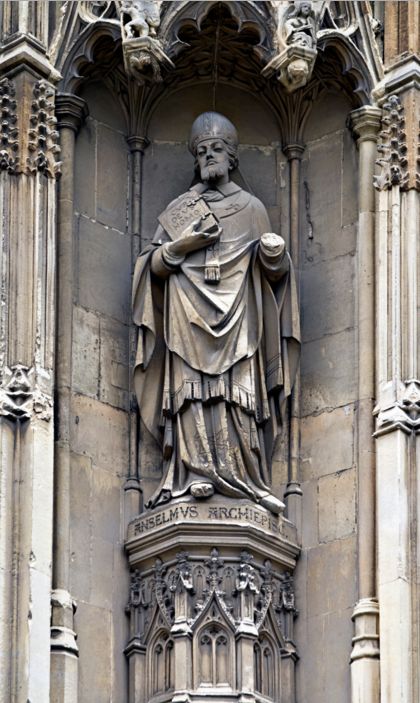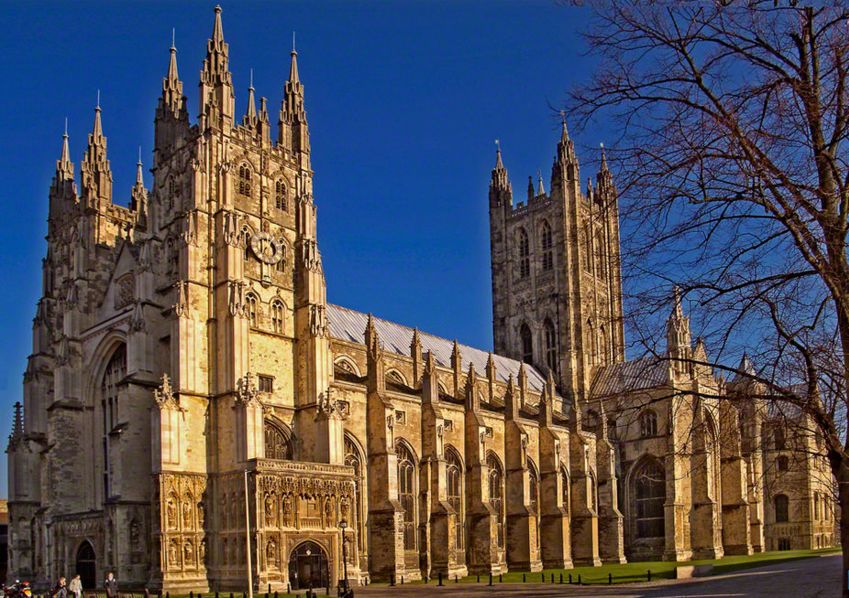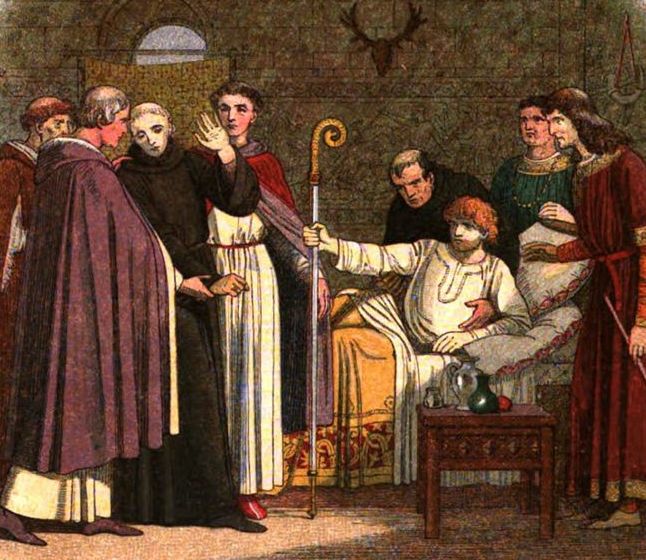|
Plinio Corrêa de Oliveira
Saint
Anselm
Disconcerting and Mysterious Ways
Saint of the Day, April 20th 1967. Without revision of the Author. |
|
|
Statue of Saint Anselm outside Canterbury Cathedral Tomorrow, the 21st, we have the feast of St. Anselm of Canterbury (1033 ca. - 1109), Bishop, Confessor, and Doctor of the Church. Intrepid in the battles of the Faith, he defended the Church against King William, the redhead. “Christ, he used to say, does not want a slave for a wife. He loves nothing in this world so much as the freedom of His Church.” An account of the consecration of St. Anselm published in Lives of the Saints by Rohrbacher: The English bishops decided to consecrate Anselm as Archbishop of Canterbury, but he flatly refused because he knew of the royal intrusion into this office. The prelates showed him the consequences of his refusal for England. The Saint replied he was aware of those problems but was old and barely able to carry himself. How could he bear the burden of an entire Church? On the other hand, it was not his nature to take care of temporal affairs. "Stick to the ways of God; we will take charge of temporal affairs," replied the prelates. Anselm said he had multiple obligations, and it was impossible to abandon them. So they took him to the sovereign (William II), who was seriously ill. The distressed king said to him, "Anselm, what are you doing? Why are you sending me to hell? Remember the friendship that my parents had for you and do not let me perish, because I know that I am condemned to die if I keep this archbishopric." All those present moved, insisted with Saint Anselm, accusing him of killing the king. The Saint turned to the two monks who accompanied him and said, "My brothers, why don't you help me?" One replied, "If this is God's will, who are we to resist Him?" "Alas! - said Anselm - You surrendered much too quickly." Seeing him so obstinate, they accused him of being a coward. They picked up a cross, grabbed his right arm, and brought him by the bed. The king handed him a Cross, but he closed his hand. The bishops tried to pry it open until they made him scream. Finally, they lifted up his hand with the Cross in it, saying, "Long live the bishop!" They took him to a neighboring church, chanted the "Te Deum," and under his protests, consecrated him." How strange and magnificent this is!
Canterbury Cathedral, England To understand the set of events, we need to bear in mind that Canterbury is the oldest diocese in England and is, therefore, the primary seat of England. At that time, more than today, archbishops and primates held some sway on the bishops of their country. Communication with Rome at that time took a long time and was very difficult, and there was not a fully organized body of apostolic nuncios. So the bishops of a given country felt a greater need to lean on one of them who was the cornerstone, and that was the Archbishop of Canterbury. This archbishop was very important because, on the other hand, in that period, the germs that would give rise to the Revolution in the future manifested themselves as a desire for temporal power. Heads of state, and particularly kings, wanted to seize the Church and its prerogatives, turning it into an instrument of material domination. They tried to silence the bishops, for at that time, many prelates blamed the kings and powerful [for their misdeeds]. They wanted to take possession of the goods with which the Church helped many poor people and maintained the splendor of divine worship. On the other hand, bishops often were feudal lords, which brought an element of impartiality into the play of life at that time. Led by a bad spirit, certain kings wanted to take over other feuds to combat the lords of ecclesiastical feuds. All these factors added together, making monarchs always concerned with appointing bishops for important positions to become their instruments. It is childish to think that this does not continue today. I could not say how successful this maneuver is, but one fact catches my attention: I do not see archbishops resisting a country’s president when he needs to be reprimanded for his conduct. So that there is something of that; this is a fact. The king and bishops ardently wanted Saint Anselm, an elderly man who had rendered numerous services to the Church, to become Archbishop of Canterbury. The bishops, because he was a natural leader in defending them against the king. The king, because he had had difficulties with the Church and was sick and fearing that he would die and might end up in hell if he did not prevent a catastrophic appointment of a bad archbishop for Canterbury. As is known, fear of hell has taken many people to Heaven, and for the vast majority of men, few things close the door of hell as much as the fear of it. Then there was that very curious scene: the bishops ask Saint Anselm to accept the post of archbishop of Canterbury, which he refuses with an argument worthy of a saint. It is not an excuse because of false humility but something true: an old, tired man who barely carries himself, exhausted by previous services to the Church, he is naturally afraid of being unable to do such a heavy job satisfactorily, and so he tries to avoid this burden. Besides, he likely knew well the king and his entourage and figured that if the king was healed, he could create more problems for the Church (once bitten, twice shy). The king’s successors, who were part of his palace retinue, also had the same mentality. Saint Anselm would have to fight the temporal power and naturally feared for his weakness, figuring that a young man would be better able to conduct this struggle. But his virtue was such and so great was the confidence that everyone had that grace would help him, and they all wanted him to become archbishop. Then comes the scene we just read -- with material violence. Perhaps there was some kind person who pulled that off smiling - the chronicle is silent about this point. But the episode is so strange that one cannot dismiss this hypothesis as absurd. Amid smiles, at a certain point, pressured by others, he decided to give in. He no longer felt physically coerced but morally persuaded that he should not resist such a general and unanimous desire. Saint Anselm would not have accepted the consecration if he was convinced that was not the will of God. Being a Saint, he would have died a martyr but would not have allowed himself to be consecrated had it not been the will of God. That would have been the first martyrdom of a priest who preferred to be killed than to become a bishop. Since he is in Heaven, we must be sure that he really wanted to accept this mission, and thus became Archbishop of Canterbury. Operating freely and wisely, divine grace at times employs very strange means. Never immoral or illegitimate, but quite possibly surprising and disconcerting. Who knows if grace wanted insistence to reach that point to show this man’s detachment and grant him more freedom to fight against the king. In any case, the words of Our Lord Jesus Christ in the Gospel come to mind: "the Kingdom of Heaven suffers violence." One needs ‘to do violence’ to enter the Kingdom of Heaven. Sometimes it is even necessary to do holy violence to God: Our Lord himself has that admirable parable of a man already lying in bed, and someone knocks on the door asking for bread. He says he has none; he is lying down and does not want to answer. But the man is so annoying that the house owner gets up, opens the door, gives him bread, and adds: "That’s because of your nagging; now just go away." Our Lord explains: this is a model for those who pray. When we have no merits, we must be very persistent. Because by dint of insistence, we as it were ‘annoy’ Our Lord and obtain what we want. Here we have something similar and are faced with the higher, unfathomable ways of God that are not always entirely explainable and form one of the beauties of Church History. If in Church History everything were explainable, clear, clean-cut like in a dairy farm, the History of the Church would not be the History of the Church of God. It would lack one of the notes that are truly divine, that is, holy mystery. The clearer it is that something is divine, the more mysterious it should be, because the presence of mystery is a mark of divine superiority that imposes respect. Making a parenthesis, let me remind you of what St. Thomas Aquinas says about obscure words in Scripture. He writes that one could make this objection against obscure passages of Scripture: “This was said to be understood. If it was said to be understood, God knows how to express Himself clearly and correctly. If it was not expressed like that, either it was not said by God, or God said something incomprehensible." How do you get out of this seemingly impossible conundrum? St. Thomas flies over it: For the formation of the human mind, divine things must have certain mysteries, and something God speaks to man showing Himself mysterious to manifest His greatness, speak of His divinity, and therefore He does not say things clearly to show how unfathomable He is. This is, therefore, an attitude full of Wisdom. The same happens in this episode with St. Anselm: they are mysteries of the Church's life. God shows His divine greatness through these mysterious facts, and later, things are explained. For some contemporaries of Our Lord, the Passion must undoubtedly have seemed an inexplicable mystery, which needed the Resurrection to be understood. We are in the presence of a mystery. We are in the presence of the greatest mystery in twenty centuries of the life of Holy Church. Let us believe in the divinity of the Church and love the Holy Catholic Church more than ever! I would never say "despite the mystery", but because of it. Only a holy and divine Church can have such fortitude, such greatness, to contain such a deep and dark mystery. She had to be a divine Church not to die from this mystery, to cross the era of mystery and show itself on the other side glorious and resplendent as if it had risen! From this small and mysterious episode in the life of Saint Anselm, we must fly to much higher regions of the great mysteries of the Catholic Church. So let us make before Our Lady, tonight, an act of love for the enormous mystery before which we are, for the tremendous mystery before which we live, certain that great mysteries later have great explanations. Never did a man face a mystery as terrible as St. Joseph, but then, what an explanation, what a clarification! It is the explanation of explanations!
Saint Anselm is led before King William II – Illustration from James Edmund Doyle’s A Chronicle of England |
|




